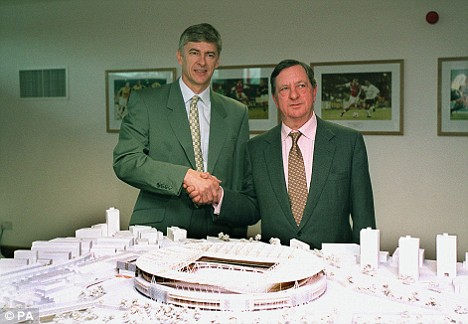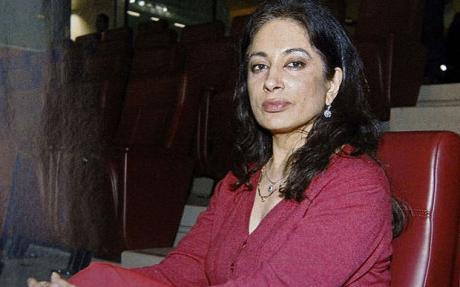The Robin Van Persie Saga: Why It's All About Money, Part 2
July 6, 2012
When I say that behind the Robin van Persie saga is money, it isn't in lieu of the role and impact of trophies in this situation. What I do say is that money is fundamentally behind all of it, and I do not believe it is a leap in logic to say so.
Ambition vs. Money
For example, when Van Persie wrote the following in his statement, that his meeting with Arsene Wenger and Ivan Gazidis "was a meeting about the club's future strategy and their policy," that his "goal has been to (read "is to") win trophies with the team and to bring the club back to its glory days," there is implied an obstacle to this stated vision and ambition: Money.
Money: Arsenal's inability to spend enough of it, to make the necessary marquee signings upon which trophies are incumbent, a fact Van Persie couches in the loaded "strategy and policy" and, again, money: other clubs' ability to spend enough of it, at any rate, enough as is satisfactory to Van Persie's expectation, his vision and ambition.
Trophies do impact all of this.
Arguably and fundamentally, the reason for sport is the quest to win, to show our superiority over others in a conducive and friendly environment (read: "as opposed to war"). So when Arsenal don't win anything in a long stretch of time, it must be expected that players would whine, and rightly so.
Trophies, I have personally thought, have been the balance missing in the Arsenal project of the last decade, the essential portion of which has been to build a huge, modern ground, one to afford Arsenal a favorable position of competitiveness in the coming decades.
This has been done, but in lieu of trophies—the main thing fans exist for, and the one thing for which athletes beat their bodies.
Peter Hill-Wood and Arsene Wenger pose behind the model of Arsenal stadium.
When this is said, it must be done with real appreciation of Arsenal's achievement in positioning themselves (via the much-maligned stadium) among the rich clubs of the world.
There are some who want the fruit without the labor, or the proper appreciation of it. Arsenal couldn't be numbered among the rich without the new stadium, the very factor that has hampered the club's ability to spend in the last seven years.
The conscious amnesia regarding this fact is unconscionable. It exposes the depth of ingratitude that exists in some corners regarding the sacrifice Wenger has had to make in order to position Arsenal for a better future.
Moreover, to simply lambast the Arsenal board without proper recognition of the things they have done right is to be shallow-minded and merely partisan.
Could Arsenal have won trophies in these years of building and drought? Yes, and with better luck they might have. In this period, they reached three cup finals, and had they won these competitions the story would be different.
Have mistakes been made in the last seven years?
Surely.
Who wouldn't do things differently if given a second chance? What we must recognize is that it is very easy to criticize, but it is another thing to take up the mantle and succeed.
Outside the fray, it is easy to see what this and that person should do. Enter the fray yourself and you see that it isn't so clear-cut. What I respect is balanced criticism. Recognize that mistakes have been made, but don't do so in lieu of the successes that have been scored.
But I wander far afield of my original intention for this part of the article, to examine Alisher Usmanov's letter to the Arsenal board.
Alisher Usmanov. Photo Courtesy of Arsenal.
Mr. Usmanov’s Letter
There is, as it were, enough piping of truth, with a golden gild to it, if you will, in the five-page letter the part stock owner of Arsenal wrote to the Arsenal board.
It contains four basic points, the first of which is that he is a loyal supporter of the club, not the troublemaker that Ivan Gazidis and other board members would make him out to be.
His support, he says, is attested to by the fact that he has invested a substantial amount of money in the club ( £200 million) and that he'd invest more if allowed.
This leads to the second point which addresses "the financial model, the lack of investment and the club's future strategic direction"—in other words, the "a"-word for ambition.
To clarify this point, I should like to quote Mr. Usmanov himself:
The real conflict seems to be between the supporters' expectations and your vision for the club and at the heart of this is the policy of so-called self-financing. The self-financing model was created to suit the major shareholders at the time, all of whom subsequently sold their shares. The previous decision by the board to fund the building of the Emirates Stadium with long-term debt was, we believe, certainly not about self-financing. If it had been, it would have been funded through a mixture of debt and non-divided equity. Instead, it allowed in our view, the majority shareholders of the time, who happened to all be board directors, to load the club with a liability, to benefit from increased future revenue streams and consequent increase in value of their holdings, whilst avoiding dilution of their equity. The board of the time then appeared to pursue a policy of increasing ticket prices and squeezing the fans to cover the short term cost increases which allowed them to bridge until all of these shareholders and board directors sold 100% of their holding and cashed out vast profits.
Mr. Usmanov identifies the departure of David Dein from Arsenal and other subsequent departures to be at the root of any conflict there may be at Arsenal.
Here is an overview of what he is talking about.
It was the much-revered Dein who sought and introduced Stan Kroenke to Arsenal, in a bid to induce investment in the club—one that could hopefully help Arsenal to be dominant in the footballing world in the immediate future and beyond.
The board was hostile to this move. Meanwhile, it appeared to have dawned on Dein that Kroenke couldn't be the investor he sought. At any rate, as the conflict escalated Dein was summarily dismissed by Peter Hill-Wood.
Dein quickly sold his shares at Arsenal to Mr. Usmanov, who seemed to fit his kind of vision. In a counter-move, Hill-Wood and other board members, some of whom appeared to have been pressured to do so, sold their own shares to Kroenke, whom they deemed more in line with their own vision of self-financing and non-interference from a rich owner.
Fundamentally, Kroenke, for the Arsenal board, was the lesser of two evils. Within Arsenal's stated principle, Kroenke's presence at Arsenal is purely commercial. He isn't going to invest any additional monies in Arsenal (say to give the club more purchasing power in the transfer market) beyond the shares he already owns.
The business sense in all this is that, as Arsenal appreciates as both a brand and a company, so does Kroenke's investment, which he can reap at any time he wants. In other words, Kroenke is a business opportunist who may not care a bit about Arsenal's fortunes on the pitch.
The indictment in the above quote is informed by this very fact.
Mr. Stan Kroenke. Getty Images.
According to Mr. Usmanov, when the Arsenal board members sold their shares to Stan Kroenke, they did exactly what Kroenke will do in the future: sell and make profit where neither he nor they contributed a penny (in any real sense) to the growth of the club from which he and they will benefit and have benefited.
Here we find the gold gilding to which I referred above. Perhaps, in the case of Kroenke, Mr. Usmanov is right, but it certainly isn't fair on the board members whom he indicts.
Even at the essential level (and this includes Kroenke's motives) investment is just that. Its point is appreciation. Unless you have some other stake in a company (say, it belongs to your family, but even so) you don't buy shares and stocks without the expectation of profit.
"The other stake" to which I refer is true in the case of the board members Mr. Usmanov indicts. I make an extended quote from David Conn of The Guardian to add perspective to the foregoing, and to highlight my point regarding the unfairness of Mr. Usmanov's indictment.
The moral basis for such prudence and sobriety was fundamentally undermined when the former shareholders, under the chairmanship of Peter Hill-Wood, made multi-millions personally. Having effectively sacked David Dein for introducing Kroenke to buy ITV's 9.9% stake in 2007, they saw Dein sell his Arsenal shares to Usmanov, making £75m. With Kroenke rehabilitated as the board's preferred alternative to Usmanov, Hill-Wood sold, making £5.5m for a stake his family had held for three generations without ever making a penny from Arsenal. Richard Carr made more than £40m, also selling a long-held family stake to Kroenke, in 2009. The timing of the final sales were prompted by the terminal illness of Danny Fiszman, who made £160m from his sale of Arsenal shares to Kroenke before he died last year. Lady Nina Bracewell-Smith, another who inherited her Arsenal shares, which were formerly considered an emotional investment of support, made £116m selling them to Kroenke.
Mr. Conn's opening sentence here refers to the fundamental principle that informs Arsenal: self-sustenance, which he says was defeated when the shareholders sold to Stan Kroenke.
Note, though, that Hill-Wood sold to undermine Dein and Usmanov. Whether he did so because he saw that Dein had made a huge profit himself is open to speculation. What is noteworthy is that both he and the other indicted members had held their shares for ages without (it appears) any thought of making profit from them.
Lady Nina Bracewell-Smith. Photo courtesy of Arsenal.
Of Hill-Wood, Conn says: "his family had held [stakes] for three generations without ever making a penny from Arsenal." Of Richard Carr, he mentions that the shares had been "a long-held family stake." Danny Fiszman sold at the point of death.
Lady Nina Bracewell-Smith (who from all indications appears to have been forced to sell so Kroenke could be enabled to assume the majority stake in Arsenal) “inherited her Arsenal shares, which were formerly considered an emotional investment of support."
What emerge here are English men and women who had invested in the company out of love, long before any possibility of profit could be discerned. In fact, when in the early 1980s David Dein bought shares in Arsenal, Peter Hill-Wood quipped that it was dead money.
To then accuse these people (which must include Dein himself) to be mere predators and profiteers—as opposed to Mr. Usmanov, whose motives, in contrast, are pure, since it is he who is a true supporter of the club, not a profiteer like the others—is to be grossly unfair.
+++
I should like readers to understand that at this point I am merely analyzing the letter, not passing judgment or taking sides (at least not yet).
Since the article is already long enough I'll stop here. I will pick up the discussion in the third part, where hopefully I will draw my conclusion.



